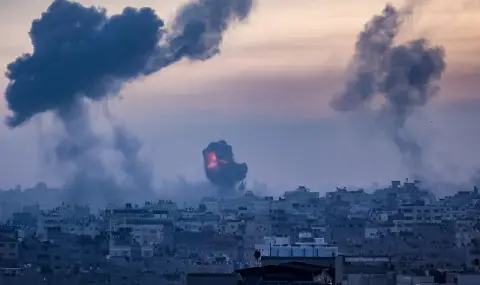Israel's military campaign in southern Lebanon has caused widespread destruction in dozens of border towns and villages, with some now looking like one large crater, satellite images provided to Reuters by the company show "Planet Labs" (Planet Labs Inc).
Many of the cities have been emptied of their inhabitants by the bombing, and there was life there for at least two centuries.
"There are beautiful old homes there that are hundreds of years old. Who knows what will be left in the end?", says Mayor of Mays al-Jabal Abdulmonem Shukeir. He is the mayor of one of the villages affected by the Israeli attacks.
Reuters compared satellite images taken in October 2023 with those taken in September and October 2024. Many of the villages have visible damage in the past month. They are located on hills overlooking Israel.
Over the past month, Israel has stepped up its strikes on southern Lebanon and beyond. Israeli troops entered the entire length of the mountainous border with Lebanon and entered into heavy clashes with fighters of "Hezbollah" in some cities.
Lebanon's disaster risk management unit, which tracks both casualties and attacks on specific cities, said the fourteen cities reviewed by Reuters had been the target of a total of 3,809 attacks by Israel over the past year.< /p>
Israeli military spokesman Daniel Hagari said on October 24 that Israel had struck more than 3,200 targets in southern Lebanon.
The military says it is attacking towns in southern Lebanon because the group "Hezbollah" has turned civilian villages into areas of its fortification. According to Israel, the group hides weapons, explosives and vehicles there. "Hezbollah" denies using civilian infrastructure to carry out attacks or store weapons. The city dwellers also deny this claim.
According to a Reuters source familiar with Israel's military operations in Lebanon, troops are systematically attacking cities with strategic observation posts, including Mhaybib. According to the source, Israel learned a lesson from its last war with "Hezbollah". in 2006, when Israeli troops entering the valleys of southern Lebanon by land were attacked by Hezbollah fighters. from the hilltops. According to him, this is why now the Israeli troops are targeting these villages so strongly - so that they can move more freely on the territory of Lebanon.
Recent photos of Kfarkela show that in a year the houses around the main road leading to the town have been razed to the ground.
In Mays al-Jabal, an entire neighborhood near the center suffered significant damage. The settlement is located 700 meters from the UN-marked "blue line" separating Israeli and Lebanese territory. Photos reveal that buildings in the area were completely razed to the ground. Photos from the same month of 2023 show a densely populated neighborhood with houses.
The Lebanese government says at least 1.2 million people have been displaced by Israeli strikes and more than 2,600 people have been killed in the past year - most of them in the past month.
Inhabitants of the border villages have not been able to return to their native places for months. “ Residents left after the war came to Mays al-Jabal. "We no longer know anything about the state of the population," says the mayor of Abdulmonem Shukeir.
Images from the nearby village of Mhaybib show a similar scale of destruction. Footage from Mhaybib and several other settlements circulated on social networks showed simultaneous explosions of several buildings at once, indicating that explosives had been planted there.
On October 24, Israeli military spokesman Daniel Hagari said that the command center of the elite unit of "Hezbollah" "Raduan" is located under Mhaybib and that Israeli troops have "neutralized the main network of tunnels" used by the group. However, he did not give further details.
Hagari stated that Israel's goal is to push "Hezbollah" from the border, to destroy its potential and remove the threat to the residents of northern Israel.
"This is a prearranged plan. The military is planning and has already put its plan into action,” says John Alterman, senior vice president at the Center for Strategic and International Studies in Washington.
Seth Jones, another senior vice president at the organization, told Reuters that "Hezbollah" used the border villages to fire short-range rockets at Israel.
Lyubnan Baalbaki, conductor of the Lebanon Philharmonic and son of the late Lebanese artist Abdel Hamid Baalbaki, says his family purchased satellite images of their hometown of Odaiseh to check if the family home was still there.
Abdel Hamid has turned the house into a cultural center filled with his artwork, original sketches and over 1,000 books. Abdel Hamid died in 2013 and is buried behind the house with his late wife.
„We are a family of artists, my father is famous and our home was a famous cultural home. We were trying to calm ourselves with that thought,”, son Baalbaki told Reuters.
Until a few days ago, the house was undamaged, but over the weekend, Baalbaki saw a video of several houses in Odaiseh exploding, including his family's.
The family is not connected to "Hezbollah" and Baalbaki denies that weapons or military equipment are stored there.
"If you have intelligence at such a high level that you can target specific military figures, then you know what's in this house. It was an art house. We are all artists. The goal is to wipe out all signs of life," says Lubnan Baalbaki.
Translation from English: Atanasi Petrov, BTA
